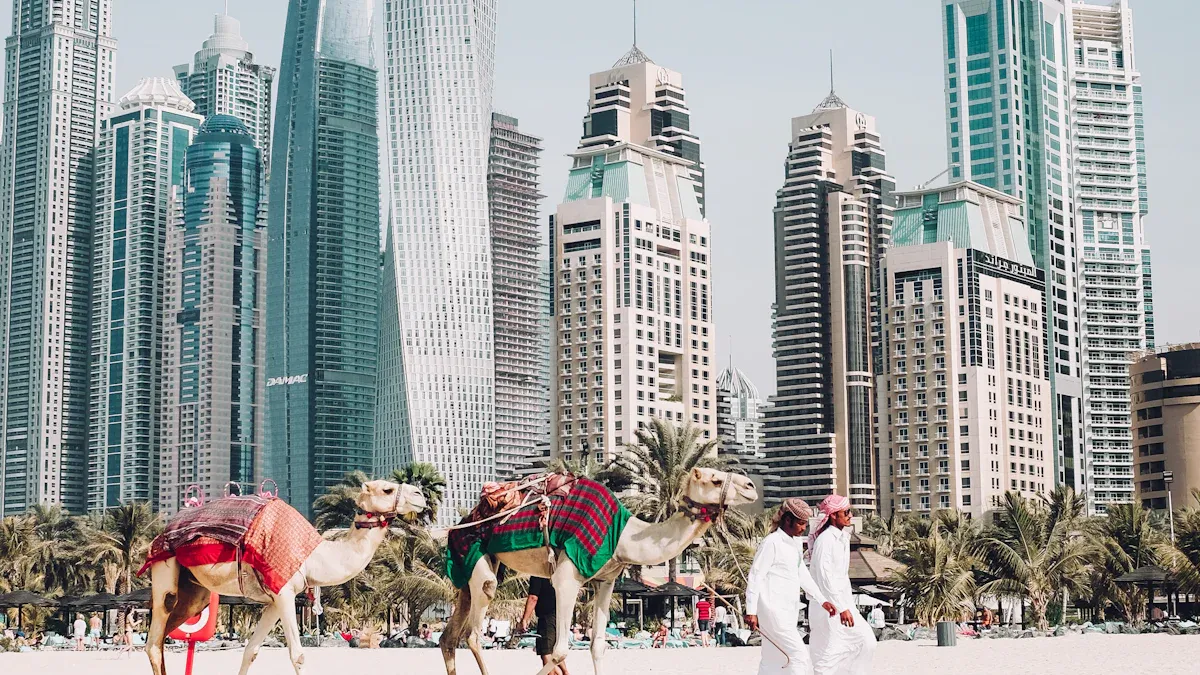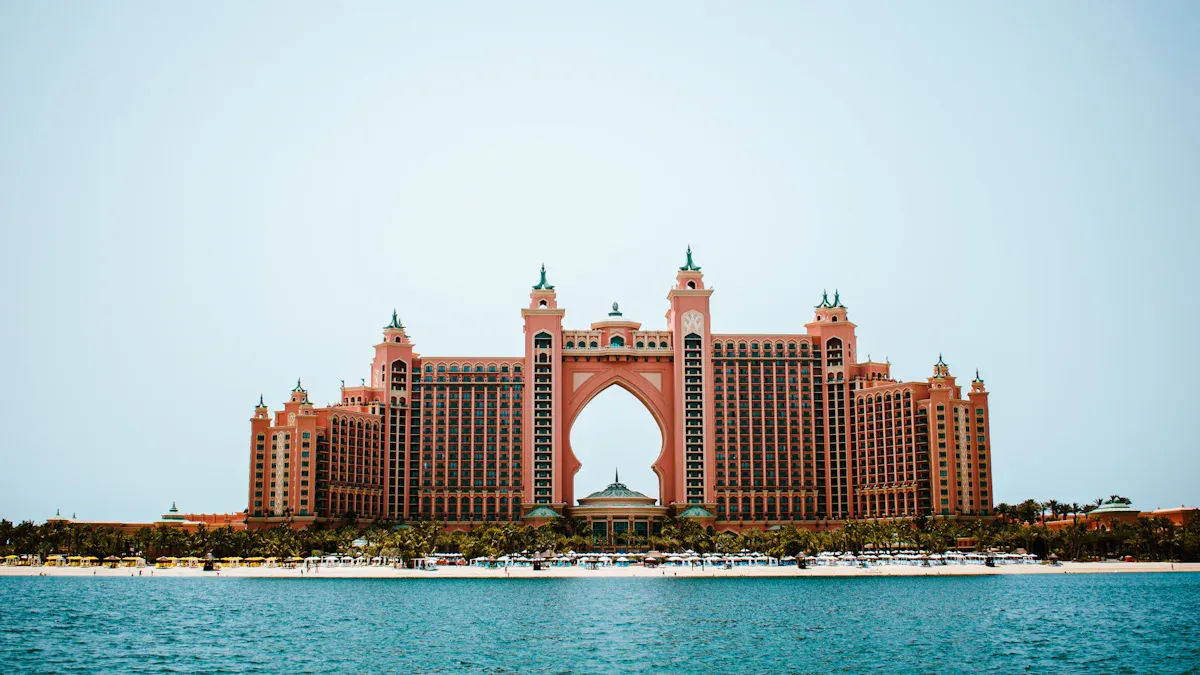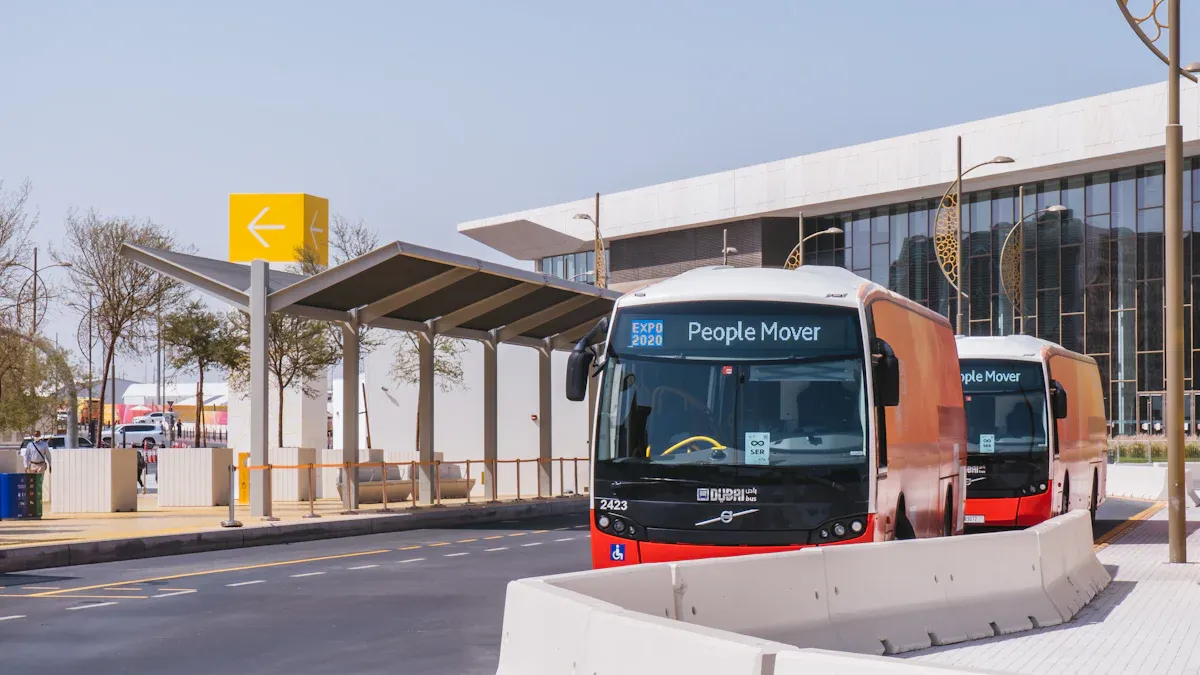- EasyCard
- Trade
- Help
- Announcement
- Academy
- SWIFT Code
- Iban Number
- Referral
- Customer Service
- Blog
- Creator
UAE Travel Guide: A Comprehensive Analysis of Visas, Attractions, Transportation, and Culture

Image Source: unsplash
When you plan to travel to the UAE, you usually need to apply for a visa in advance. Some countries’ tourists can benefit from visa-on-arrival or e-visa policies, with a straightforward application process. Common visa types include:
- Short-term tourist visa (up to 30 days)
- Long-term tourist visa (up to 90 days)
- Multiple-entry tourist visa
- Work visa
- Family residence visa
- Investor visa
- Student visa
- Transit visa
The table below shows the changes in tourist numbers from major source countries in recent years:
| Country | 2020 | 2019 | 2018 | 2017 | 2016 | 2015 |
|---|---|---|---|---|---|---|
| India | 1,224,349 | 2,855,096 | 2,778,160 | 2,511,933 | 2,080,380 | 1,881,489 |
| Oman | 634,879 | 2,814,152 | 2,172,910 | 1,928,292 | 2,021,958 | 1,716,930 |
| Saudi Arabia | 512,875 | 1,897,471 | 1,993,646 | 1,876,316 | 1,921,916 | 1,662,435 |
| Pakistan | 418,973 | 840,222 | 819,683 | 763,396 | 767,724 | 671,847 |
| United Kingdom | 418,385 | 1,367,997 | 1,365,160 | 1,452,455 | 1,460,328 | 1,394,118 |
| Russia | 335,016 | 866,857 | 800,253 | 610,427 | 304,295 | 269,493 |

You can use this UAE travel guide to understand the latest policies and practical information to plan your trip effectively.
Key Points
- Apply for a UAE visa in advance and understand the different visa types to meet your travel needs.
- In Dubai and Abu Dhabi, use the metro and buses to save on transportation costs and time.
- Visit iconic UAE attractions like the Burj Khalifa and Sheikh Zayed Grand Mosque to experience local culture and history.
- Respect local religious customs and dress codes to ensure appropriate behavior during your trip.
- Plan your budget wisely, choosing budget accommodations and local restaurants for a cost-effective travel experience.
Visa Application
Visa Types
When planning your UAE trip, you can choose from various visa types. Different visas suit different stay durations and needs. The table below shows the main tourist visa types and eligible nationalities:
| Visa Type | Stay Duration | Eligible Nationalities |
|---|---|---|
| Dubai Tourist Visa | 30 or 90 days | Applicable to all countries |
| Short-Term Visa | 30 days | Applicable to all countries |
| Long-Term Visa | 90 days | Applicable to all countries |
You can choose the appropriate visa based on your travel itinerary. The UAE also offers multiple-entry visas and work exploration visas. If you plan to enter and exit the UAE multiple times, consider a multiple-entry visa. Recent policy changes have reinstated the 60-day single-entry tourist visa, giving you more time to explore local culture and attractions.
Tip: The UAE travel guide recommends checking the latest visa policies in advance to avoid itinerary disruptions due to policy changes.
Application Process
You can apply for a UAE tourist visa through e-visa or visa-on-arrival methods. The e-visa application process is simple and suitable for most tourists. The steps for applying for an e-visa are as follows:
- Visit official or authorized websites like VisaHQ.
- Fill out the online application form, ensuring accurate information.
- Upload required documents, including a passport copy, recent passport photo, hotel booking confirmation, and round-trip flight tickets.
- Submit the application and pay the visa fee (a 30-day standard tourist visa costs about USD 95, while family or friend visit visas range from USD 82 to USD 191).
- Await the review results, typically received via email.
Visa-on-arrival policies apply to certain countries and regions. If you hold an eligible passport, you can apply for a visa upon arrival at UAE airports. You need to prepare your passport, return flight ticket, and proof of accommodation.
Note: The UAE travel guide reminds you that e-visa application documents must be clear and authentic to avoid rejection due to discrepancies.
Validity and Notes
The validity and stay duration of UAE tourist visas vary by type. Standard tourist visas typically allow a stay of 30 or 90 days. New policies allow some visas to be extended for 30 days, up to a maximum of 120 days, but extensions are limited to twice per year. Multiple-entry visas are suitable for tourists needing frequent re-entry.
You need to note the following:
- Visa fees vary based on processing speed and whether travel insurance is included.
- The UAE has canceled the in-country extension policy for standard tourist visas. If you need to extend your stay, you must exit and reapply for a visa.
- Overstaying a visa may result in fines or affect future entry records.
- You should plan your itinerary in advance to ensure the visa validity covers the entire trip.
Reminder: The UAE travel guide suggests reconfirming the visa validity and entry conditions before departure to avoid disruptions due to policy changes.
UAE Travel Guide: Must-Visit Attractions

Image Source: pexels
This UAE travel guide selects iconic attractions and unique experiences across various emirates. You can explore the culture, history, and natural beauty of each city based on your interests.
Dubai Attractions
Dubai is renowned for its modern architecture and diverse culture. You can experience world-class landmarks and rich entertainment activities here. The table below lists Dubai’s top five most popular attractions:
| Rank | Attraction Name | Description |
|---|---|---|
| 1 | Burj Khalifa | The world’s tallest building, standing at 828 meters, with a shopping mall and hotel facilities. |
| 2 | Dubai Fountain | The world’s most popular free attraction, with water jets reaching up to 15 meters, accompanied by lights and lasers. |
| 3 | Dubai Mall | The city’s largest shopping mall, with over 1,000 stores and restaurants. |
| 4 | Dubai Miracle Garden | The world’s largest garden, open seasonally, located in Al Barsha South. |
| 5 | Global Village | A seasonal shopping event showcasing the culture and cuisine of multiple countries. |
You can visit the Burj Khalifa observation deck for a panoramic view of the city. The Dubai Fountain’s musical performances take place multiple times daily, attracting many tourists. The Dubai Mall is not only a shopping paradise but also features an aquarium and ice rink. The Miracle Garden is famous for its giant floral sculptures, perfect for photos. Global Village allows you to experience the culture and cuisine of multiple countries in one place.
Tip: In Dubai, you can experience a perfect blend of modernity and tradition. Plan your attraction routes in advance to save on transportation time.
Abu Dhabi Attractions
Abu Dhabi, the capital of the UAE, boasts rich cultural and historical heritage. You can visit the following famous attractions:
- Sheikh Zayed Grand Mosque: This mosque is a masterpiece of modern Islamic architecture, with stunning white marble and golden domes. You can join free guided tours to learn more about Islamic culture.
- Louvre Abu Dhabi: This museum houses art treasures from around the world, and its architecture is a highlight. You can view artworks from ancient times to the present.
- Abu Dhabi Cultural Village: You can experience traditional UAE crafts, henna painting, and folk performances, immersing yourself in local lifestyles.
- Ferrari World: If you enjoy thrills, visit the Ferrari-themed park to experience the world’s fastest roller coaster.
In Abu Dhabi, you can admire grand architecture and gain a deeper understanding of UAE history and art.
Other Emirates
Beyond Dubai and Abu Dhabi, other emirates offer many attractions worth exploring. You can refer to the table below for highlights of each emirate:
| Emirate | Main Attractions |
|---|---|
| Sharjah | 1. Islamic Civilization Museum: Showcases over 5,000 artifacts. 2. Al Noor Island: Features beautiful sculptures and a butterfly house. 3. Heart of Sharjah: Traditional houses and markets. |
| Ajman | 1. Ajman Beach: A quiet beach perfect for relaxation. 2. Ajman Museum: An 18th-century museum showcasing history. 3. Al Zorah Nature Reserve: A haven for bird watching. |
| Umm Al-Quwain | 1. Dreamland Aqua Park: A family-friendly waterpark. 2. Umm Al-Quwain Fort: An 18th-century historical site. 3. Al Sinniyah Island: A nature reserve. |
| Ras Al Khaimah | 1. Jebel Jais: The UAE’s highest peak, ideal for adventure activities. 2. Dhayah Fort: A 16th-century fortress offering panoramic views. 3. Wadi Shawka: A popular spot for hiking and camping. |
| Fujairah | 1. Snoopy Island: Ideal for diving and snorkeling. |
You can learn about Arab history at Sharjah’s Islamic Civilization Museum or relax on Ajman’s beaches. Umm Al-Quwain’s Ed Dur archaeological site showcases remnants of an ancient trade hub, while Umm Al-Quwain Fort offers a glimpse of 18th-century mud-brick architecture. Ras Al Khaimah’s Jebel Jais is perfect for adventure enthusiasts, and Fujairah’s Snoopy Island is a diver’s paradise.
You can also try these unique experiences:
- Stroll along Sharjah Corniche to enjoy sunset views.
- Kayak through Ajman’s mangroves for a nature escape.
- Take a boat to Umm Al-Quwain’s Al Sinniyah Island to observe wildlife.
- Experience the world’s longest zipline, Jebel Jais Flight, in Ras Al Khaimah.
- Dive at Fujairah’s Snoopy Island to explore coral reefs.
Unique Experiences
This UAE travel guide not only recommends visiting iconic landmarks but also encourages experiencing diverse cultures and local lifestyles. You can try the following activities:
- Visit the Sheikh Zayed Grand Mosque to appreciate the beauty of Islamic architecture.
- Experience multicultural shopping and fun at Global Village.
- Ride an Abra wooden boat on Dubai Creek to experience traditional water transport.
- Explore UNESCO heritage sites in the desert to learn about ancient tombs.
- Learn about falconry and visit the world’s largest falcon hospital to understand UAE cultural traditions.
- Bargain at traditional markets to buy handmade souvenirs.
- Try henna painting at Abu Dhabi Cultural Village to experience traditional UAE women’s art.
In the UAE, you can experience a perfect blend of modern cities, historical sites, and natural landscapes. The UAE travel guide suggests combining city attractions with unique experiences to create your own travel plan.
Transportation

Image Source: unsplash
City Transportation
When traveling in UAE’s major cities, you can choose metro, buses, trams, or taxis. Dubai’s metro system is extensive, with the Red and Green Lines operating from 5 AM to midnight, extending to 1 AM on weekends. Metro fares vary by distance, ranging from AED 3 to AED 7.5. Dubai’s tram connects the waterfront and major commercial areas, with a fare of AED 3 per ride. Abu Dhabi and Sharjah have well-developed bus systems, with starting fares of AED 2 and AED 6, respectively. Taxis are common across cities, with starting fares of AED 8 in Dubai and AED 3.5 in Abu Dhabi. You can refer to the table below for transportation options and starting fares in major cities:
| Transport Type | City | Starting Fare (AED) |
|---|---|---|
| Bus | Abu Dhabi | 2 |
| Bus | Dubai | 3 |
| Bus | Sharjah | 6 |
| Metro | Dubai | 3 - 17 |
| Tram | Dubai | 3 |
| Taxi | Abu Dhabi | 3.50 |
| Taxi | Dubai | 8 |
| Taxi | Sharjah | 11.50 |
| Water Transport | Dubai | 2 - 75 |

When riding the metro or buses in Dubai and Abu Dhabi, you can use a Nol card or Hafilat card for convenient recharging.
Inter-City Transportation
When traveling between UAE emirates, you can choose long-distance buses or taxis. Long-distance buses connect major cities like Dubai, Abu Dhabi, and Sharjah, with affordable fares and frequent schedules. You can take a bus from Dubai’s Al Ghubaiba or Ibn Battuta stations to Abu Dhabi, with a journey of about 2 hours. Taxis are suitable for groups or travelers with luggage, offering higher comfort but at a higher cost. Some cities also offer ride-sharing services, ideal for budget-conscious tourists.
Airport Transportation
After arriving at UAE airports, you can choose various transportation options to reach the city center. Dubai International Airport and Abu Dhabi International Airport offer metro, bus, and taxi services. Dubai Airport’s Red Line metro connects directly to the city center, with fares from AED 3 to AED 7.5. Taxis operate 24/7, ideal for nighttime arrivals or travelers with large luggage. Some airports also provide shuttle buses to major hotels and attractions.
Tip: When taking a taxi from the airport, confirm the starting fare and pricing method in advance to avoid misunderstandings.
Attraction Transportation
When visiting attractions in the UAE, you can choose suitable transportation based on distance and convenience. City attractions like the Burj Khalifa, Dubai Mall, and Sheikh Zayed Grand Mosque are accessible by metro or bus. For suburban or desert attractions, consider hiring a car or joining a local day tour for convenience and safety. In Dubai, you can also experience water buses or Abra boats for a taste of traditional transport.
The UAE travel guide suggests planning transportation routes in advance to optimize time and enhance your travel experience.
Cultural Customs
Religion and Behavioral Norms
When traveling in the UAE, you need to respect local religious beliefs and behavioral norms. The UAE is an Islamic country, and Muslims pray five times daily, so you may see people praying in public places. You should note the following:
- During Ramadan, Muslims fast from sunrise to sunset, and you should avoid eating or drinking in public.
- Intimate behaviors (e.g., hugging, kissing) in public are unacceptable and may face legal consequences.
- Arab hosts often offer tea or coffee to guests, and you should accept politely.
- The formal greeting is “As-Salam Alaykum,” with the response “Wa’alaykum As-Salam.”
The UAE travel guide suggests respecting local religious customs and avoiding inappropriate behavior.
Dress and Women’s Considerations
In UAE public places, you should dress modestly. Clothing should not be transparent or reveal sensitive body parts. Both men and women should wear loose-fitting clothes covering shoulders, arms, and legs. Women visiting mosques must wear an abaya and cover their hair, with attire often provided by the mosque. Swimwear is strictly prohibited outside beaches, waterparks, or pools. Dubai is more lenient with tourist attire, but in malls and traditional markets, avoid wearing shorts or miniskirts.
Dining and Etiquette
When dining in the UAE, you should observe table etiquette. Dress should be formal or smart casual, avoiding overly casual attire. During meals, keep quiet and avoid loud conversations. You should eat with your right hand and avoid using your left. Utensils should be placed in the center of the plate after use. During meals, keep your phone off or on silent and avoid placing it on the table. Tipping appropriately shows respect for the server.
Festivals and Regulations
The UAE has many significant festivals, such as Eid al-Fitr and Eid al-Adha. During festivals, shops and attractions may adjust operating hours. You should check regulations in advance and plan your itinerary accordingly. Some festivals feature public celebrations, allowing you to experience the lively local atmosphere. During religious events, maintain quietness and respect the order of the occasion.
Budget and Expenses
Accommodation
When traveling in the UAE, accommodation costs account for a significant portion of your budget. The average price for a single hotel room is USD 159 per night, while a double room costs about USD 319. Prices vary by city and season. You can choose budget hotels, hostels, or homestays to reduce costs. Booking in advance often secures better rates. The table below shows average daily expenses for accommodation, food, and transportation:
| Category | Cost (USD) |
|---|---|
| Accommodation (Single) | $159 |
| Accommodation (Double) | $319 |
| Food (Daily) | $85 |
| Transportation (Daily) | $16 |

Dining and Tickets
You can enjoy a variety of cuisines in the UAE. The average daily dining cost is about USD 85. Eating at local restaurants or cooking your own meals can save money. Attraction ticket prices vary significantly. For example, Burj Khalifa observation deck tickets cost USD 45, Museum of the Future tickets are USD 40, and desert safari experiences range from USD 60 to USD 100. You can refer to the table below to plan your budget:
| Attraction | Ticket Price (USD) |
|---|---|
| Burj Khalifa – “At the Top” | $45 |
| Burj Khalifa – “Sky” | $110 |
| Dubai Frame | $15 |
| Museum of the Future | $40 |
| Desert Safari | $60–$100 |
| Aquaventure Waterpark | $85 |
| La Perle show | $75–$130 |
| Day pass to a beach club | $40–$100 |
You can use ticketing apps to purchase tickets, manage bookings, and enjoy discounts.
Transportation Costs
When traveling in the UAE, transportation costs are relatively reasonable. The average daily transportation expense is USD 16. You can choose metro, buses, or taxis. Metro and buses are ideal for short city trips, with low fares. Inter-city buses are also convenient. Taxis are more expensive but suitable for groups or travelers with large luggage. Plan your routes in advance to save time and money.
Cost-Saving Tips
You can effectively control your travel budget with the following methods:
- Use city passes, such as Dubai or Abu Dhabi city passes, to enjoy discounts on attraction tickets.
- Optimize currency exchange, avoiding airport exchanges for better rates.
- Use metro and buses more to reduce taxi usage.
- Eat at local restaurants or cook to save money while experiencing local flavors.
- Book flights and hotels in advance for lower prices.
You can stroll for free at Dubai Marina or Al Seef, watch fountain shows, or visit gold and spice souks for low-cost leisure activities.
The UAE travel guide suggests tailoring your budget to your needs for a cost-effective travel experience.
Itinerary Planning
5-Day Itinerary
You can choose a classic 5-day itinerary to quickly experience the UAE’s highlights. On day one, arrive in Dubai and visit the Burj Khalifa and Dubai Mall. On day two, explore Dubai’s old town and gold souk, and ride an Abra boat. On day three, head to Abu Dhabi to visit the Sheikh Zayed Grand Mosque and Louvre Abu Dhabi. On day four, experience a desert safari for an Arabian adventure. On day five, return to Dubai to visit the Miracle Garden or Global Village before concluding your trip.
7-Day Recommendation
If you have 7 days, you can plan a richer experience. Spend two days each in Dubai and Abu Dhabi, exploring museums, mosques, and modern architecture in depth. Next, visit Sharjah to see the Islamic Civilization Museum and traditional markets. On day six, head to Ras Al Khaimah for the Jebel Jais zipline. On the final day, snorkel at Fujairah’s Snoopy Island or relax on Ajman Beach.
Best Seasons
When planning your itinerary, consider the best travel seasons.
- From October to February, cooler temperatures are ideal for outdoor activities, ranging from 20°C to 30°C.
- This period is peak season, with higher accommodation and activity prices.
- Key events include the Dubai Shopping Festival in January and February, the Abu Dhabi Grand Prix in November, and National Day celebrations on December 2.
Itinerary Tips
You can tailor your itinerary based on interests and budget. Book hotels and tickets in advance to avoid peak times. During hot seasons, take precautions for sun protection and hydration. The UAE travel guide suggests planning transportation and attraction sequences to enhance your experience. If you enjoy cultural experiences, prioritize museums and mosques. For nature lovers, opt for desert adventures and island snorkeling.
Dining and Shopping
Traditional Cuisine
You can enjoy a variety of traditional cuisines in the UAE. The table below lists some of the most iconic UAE dishes and their descriptions:
| Dish Name | Description |
|---|---|
| Khuzi | The UAE’s national dish, roasted lamb with spiced rice, often served on special occasions. |
| Harees | A porridge-like dish, common during major holidays and family gatherings. |
| Machboos | A spiced rice dish with lamb, chicken, or seafood. |
| Thareed | A hearty slow-cooked stew with lamb or chicken, potatoes, and vegetables, often eaten during Ramadan. |
| Luqaimat | Fried dough balls, often paired with hot coffee, popular during festivals. |
You can experience authentic UAE flavors at restaurants like Arabian Tea House (Dubai, Sharjah), Logma (Dubai Mall), and Al Mrzab Traditional Restaurant (Abu Dhabi).
International Cuisine
The UAE offers diverse international cuisines. In Dubai and Abu Dhabi, you can easily find Italian, French, Japanese, Indian, and other restaurants. Many luxury hotels feature Michelin-starred restaurants to satisfy your global culinary explorations. Food courts in large shopping malls offer fast food and specialty snacks, with prices ranging from USD 10 to USD 50.
Shopping Experience
You can enjoy a world-class shopping experience in the UAE. The table below lists major Abu Dhabi shopping malls and their features:
| Shopping Mall Name | Unique Features | Location | Opening Hours |
|---|---|---|---|
| Abu Dhabi Mall | Over 200 stores, selling local specialty foods and desserts, with a cinema. | Tourist Club Area, Abu Dhabi | Thu-Fri 10:00-23:00, others 10:00-22:00 |
| The Galleria | Luxury brands, with a rooftop park. | Al Maryah Island | Sat-Wed 10:00-22:00, Thu-Fri until midnight |
| Marina Mall | Over 400 stores, with entertainment like bowling and trampoline parks. | Near Corniche Road | Sat-Wed 10:00-22:00, Thu-Fri until midnight |
| Dalma Mall | Over 450 stores, suitable for family entertainment. | Abu Dhabi Al Ain Highway | Sat-Wed 10:00-22:00, Thu-Fri until midnight |
| Souk Central Market | Traditional Arab market selling crafts and spices. | Hamdan Street | 9:00-2:00 |
You can purchase international brands, Arabian spices, crafts, and specialty desserts at these malls, experiencing a blend of modernity and tradition.
Nightlife
You can experience diverse nightlife in the UAE. Dubai’s nightclubs, rooftop bars, and beach clubs are popular, mainly located in the city center, Sheikh Zayed Road, and Dubai Marina. You need to note that only licensed venues can sell alcohol, and the drinking age is 21. Drinking is restricted to designated venues, and public intoxication may result in penalties. When enjoying nightlife, adhere to local laws to ensure safety. The UAE travel guide suggests checking venue regulations in advance and planning your itinerary accordingly.
Practical Tips
Avoiding Pitfalls
When traveling in the UAE, noting the following common pitfalls can ensure safety and a better experience:
- Women should avoid traveling alone at night, as traveling with a companion is safer.
- Be cautious with newly met individuals and avoid accepting food or drinks from them.
- For water activities, choose reputable companies and strictly follow safety instructions.
- During desert adventures, hire experienced guides and bring sufficient water and gear.
- Drive defensively and avoid getting too close to other vehicles.
Familiarizing yourself with these tips in advance can effectively reduce travel risks.
Common Questions
When planning your UAE trip, you may encounter the following questions:
- The UAE’s official language is Arabic, but most people speak English, making communication seamless.
- You can purchase alcohol at Dubai’s duty-free shops, but regulations vary by emirate, and drinking must comply with local laws.
- The UAE Dirham (AED) is the official currency, and carrying some cash is recommended for daily convenience.
- You can plan your trip around major events like the Dubai Shopping Festival or UAE National Day to experience the festive atmosphere.
Must-Have Apps
When traveling in the UAE, downloading the following apps can enhance travel efficiency:
| App | Function Description | Pros | Cons |
|---|---|---|---|
| Google Maps | Real-time traffic navigation, suitable for walking, driving, and public transport | Accurate navigation, rich street view features | High battery consumption, occasional errors |
| Waze | Community-based traffic info, real-time accident and road condition alerts | Fast traffic updates, carpooling options | Requires stable network, limited offline functionality |
| RTA Smart Drive | Dubai’s official navigation, supports online and offline maps | Strong offline functionality, clear maps | Complex interface, requires adaptation |
| Careem | Ride-hailing and food delivery integrated service | Diverse services, user-friendly interface | No significant drawbacks |
| Uber | International ride-hailing platform, covers Dubai and Abu Dhabi | Reliable, suitable for existing account holders | No significant drawbacks |
| RTA Dubai | Dubai’s official public transport app, Nol card recharging, and real-time info | Convenient for bus planning, easy recharging | No significant drawbacks |
| Darb | Abu Dhabi’s public transport app, bus planning, and parking management | Convenient bus planning, parking account management | No significant drawbacks |
Emergency Response
If you encounter an emergency in the UAE, you can seek help through the following methods:
| Service Type | Contact Information |
|---|---|
| Medical Emergency | Dial 998 (nationwide) |
| Abu Dhabi Tourist Police | +97128002626, +97125127777 |
| Dubai Tourist Police | +97146096239, toll-free 901 |
| touristpolice@dubaipolice.gov.ae | |
| Hospital Inquiries | Dial 8001717 (Abu Dhabi region) |
Save these contact details on your phone to seek help promptly in emergencies, ensuring your safety.
When traveling in the UAE, you can experience desert adventures, panoramic views from the Burj Khalifa, and shopping in malls and traditional souks. You can also use convenient public transportation for eco-friendly travel. Different seasons suit different activities, with fall and winter ideal for outdoor and beach activities, and summer better for indoor visits.
You should monitor visa validity, respect local culture, and plan your budget wisely. Claim a free SIM card at the airport and keep your boarding pass for city discounts. Language barriers are minimal, as English communication is convenient. The UAE offers various accommodation options, with more affordable costs than expected. Wishing you a pleasant trip and unforgettable experiences!
FAQ
What payment methods are available in the UAE?
You can use credit cards, debit cards, and cash for payments. Most malls and restaurants accept international credit cards. For small markets or taxis, it’s recommended to carry some cash.
How can Mainland Chinese tourists exchange currency?
You can exchange USD at airports, hotels, or Hong Kong-licensed banks. It’s recommended to check exchange rates in advance. Fees may be higher at airports.
Is travel insurance required for the UAE?
It’s recommended to purchase travel insurance when applying for a visa. Insurance covers medical and luggage safety. Some visa types require proof of insurance.
Are Chinese-language services available in the UAE?
You can find English services at major attractions and shopping malls. Some large malls and hotels offer Chinese signage. It’s advisable to prepare a translation app in advance.
Is the UAE safe? What should female tourists note?
Traveling in the UAE is generally safe. Female tourists should travel with companions and avoid going out alone at night. Dress modestly in public and respect local customs.
Planning a UAE trip can be challenging with high bank transfer fees ($15-$30 per transaction), hidden rate markups (3-6%), and slow processing (3-5 days), which can disrupt visa payments, flight bookings, or attraction costs. As a cost-conscious traveler, you need a fast, affordable, and secure platform to manage your travel funds efficiently.
BiyaPay offers the ultimate solution, with real-time exchange rate queries to monitor USD-to-AED rates and convert fiat to crypto, reducing volatility risks. Remittance fees start at just 0.5%, with zero-cost contract orders and global same-day delivery. Plus, you can invest in US and Hong Kong stocks on BiyaPay without an overseas account, optimizing your travel budget.
Sign up for BiyaPay now to unlock effortless cross-border finance! From visa fees to shopping sprees, cut costs and speed up transactions for a stress-free UAE adventure. Don’t let high fees and delays derail your plans—join BiyaPay today for a smarter, smoother travel experience!
*This article is provided for general information purposes and does not constitute legal, tax or other professional advice from BiyaPay or its subsidiaries and its affiliates, and it is not intended as a substitute for obtaining advice from a financial advisor or any other professional.
We make no representations, warranties or warranties, express or implied, as to the accuracy, completeness or timeliness of the contents of this publication.




Contact Us
Company and Team
BiyaPay Products
Customer Services
is a broker-dealer registered with the U.S. Securities and Exchange Commission (SEC) (No.: 802-127417), member of the Financial Industry Regulatory Authority (FINRA) (CRD: 325027), member of the Securities Investor Protection Corporation (SIPC), and regulated by FINRA and SEC.
registered with the US Financial Crimes Enforcement Network (FinCEN), as a Money Services Business (MSB), registration number: 31000218637349, and regulated by FinCEN.
registered as Financial Service Provider (FSP number: FSP1007221) in New Zealand, and is a member of the Financial Dispute Resolution Scheme, a New Zealand independent dispute resolution service provider.



















